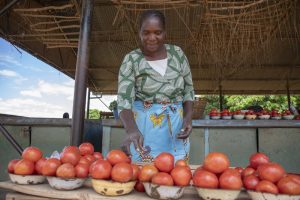How one farming community is defending itself against climate change
A farmer in Zimbabwe shares how an Oxfam initiative helped build resilience against the effects of changing rainfall patterns.
Sarah, 55, is a farmer in Nyanyadzi, Chimanimani, Zimbabwe. For nearly a quarter-century, her livelihood has been at the mercy of changing weather patterns, as shifting rainfall patterns have resulted in major fluctuations in her harvests.
“Where we expect it to rain [in October or November], it doesn’t rain,” she says. “So what we have planted doesn’t grow well because the rain hasn’t come as expected.”
In 2000, Tropical Cyclone Eline—one of the strongest storms to hit southeastern Africa—damaged the main canals on the north bank of the Nyanyadzi River, which Sarah and her family rely on to irrigate their land.
“We woke up to a field full of sand with all the crops gone,” she says. After the storm, the canals were covered with silt. To gain access to water, farmers had to shovel the canals out.
Since then, people in Nyanyadzi have been vulnerable to weather extremes, from frequent heavy rain, shifting rainfall patterns, and prolonged drought. At times, Sarah reports, she has gone a month and a half without water.
Sarah is a widow and the sole provider of income and caretaking for her children. What her family eats comes from her fields, so if her harvest is damaged, they might not be able to eat.
“It’s not just the crops that are affected,” she says. “I wake up every day and say that I am going to work so that I can send my children to school. …While I am working, I will be hoping that the crops I plant grow well, so that my children can survive, go to school, and have something to eat.”
Adapting agriculture practices that protect farmers from the harmful effects of climate change
In 2014, Oxfam and partner organizations implemented “Scaling up Adaptation in Zimbabwe,” a project to support rural farming communities and build climate resilience. Sarah and members of her community received lessons in water management and irrigation infrastructure, including training in gabion basket making and construction of gulley plugs and silt traps. Gabions are structures used to control erosion, and this new setup stopped silt from moving into canals.
Now, with the canals functioning as they should, Sarah can do her job. She points out that this year there were no breakdowns or water shortages.

Sarah sells her tomatoes at the market. Photo: Cynthia Matonhodze/Oxfam
When Cyclone Idai devastated southern Africa in 2019, Sarah was mostly spared. She lost some land when the Odzi River flooded, but she considers herself lucky compared to the damages to property and loss of life others had to endure. However, the line pipe that collects water was swept away. This issue has yet to be fixed; without support, Sarah says it will have an effect on the community’s ability to secure water.
“I am good farmer,” she says. “If I get enough water, and I have my inputs, I really have a good farming season.”
Join the movement to stop climate change
The climate crisis is affecting people in every country on every continent, but it is those with the fewest resources—like farmers in Sarah’s community—who are enduring its harshest effects. By the 2030s, large parts of Southern, Eastern, and the Horn of Africa, and South and East Asia will experience greater exposure to droughts, floods, and tropical storms.
With your help, we’re working toward bigger, bolder action that will deliver a more resilient and dignified future in which everyone can thrive, not just survive.

